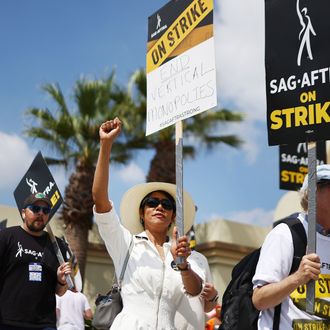When Is SAG Strike Ending After WGA Deal? (original) (raw)
SAG Is ‘Ready’ to Take on Studios Next

It’s not over until it’s over.Photo: Mario Tama/Getty Images
Writers on strike might be able to see the light at the end of the tunnel, but can the same be said for the actors? SAG-AFTRA and the AMPTP agreed to resume negotiations on September 28, the same day the writers formally ended their own labor action. “SAG-AFTRA and the AMPTP will meet for bargaining on Monday, Oct. 2,” the union said in a statement. “Several executives from AMPTP member companies will be in attendance. As negotiations proceed, we will report any substantiative updates directly to you.” Don’t get it twisted — picketing is still very much ongoing until a deal is brokered. “We urge you to continue coming out to the picket lines in strength and big numbers every day!” they wrote.
The Writers Guild of America reached their own tentative agreement with the AMPTP on September 24 after a record 146-day walkout to demand increased staffing, fair residuals, and AI protections, among other issues. As the WGA prepares to sign a new contract, the Screen Actors Guild has remained stuck in limbo since July 14, waiting for the studios to make a fair offer that would end the actors’ strike.
It won’t be smooth sailing when studios come back to the table even though SAG-AFTRA’s terms aren’t all that different from the WGA’s. They, too, need the studios to agree on a new residual model that takes streaming success into consideration, fair pay, AI protections, together with limits on self-tape auditions that ensure actors aren’t forced to produce time-consuming and expensive self-tape auditions. SAG-AFTRA has signaled that they will not will agree to terms that would leave members making less in real dollar terms than they were three years ago. Wage increases continue to be a major sticking point in negotiations, and potential concessions made by the WGA could hinder any agreement between actors and the AMPTP. Studios say SAG’s offer would cost around a billion dollars in pay increases alone.
In the end, writers won a 5 percent bump on most wage minimums and select residual bases. That number will not work for the actors. “SAG wanted 15, they’ve gone down to 11,” journalist and entertainment lawyer Jonathan Handel told Vultureon September 25. “Two months ago, the studios were offering five. The basic wage increases may end up being a big a big stumbling block, because SAG is not going to do a deal at 6 percent. Even at 5 percent, the basic wage increase is 85 percent of the cost of the offer, and 11 percent is as much as 90 or 91 percent” of the full dollar cost of SAG’s terms. Handel guesses the strike could be resolved by the end of October if the two parties reach consensus on the major issues. Whatever deal is struck by the studios and SAG would greatly influence other industry guilds — the Teamsters truck drivers and IATSE crew unions will negotiate contracts next year that could unilaterally shut down production if they decide to strike.
Writers were able to get studios to largely capitulate to their demands, or at least found some sort of compromise that left the WGA with an acceptable contract. That’s a good sign for actors. Hollywood might be ready to make a reasonable offer to end this strike business once and for all. Maybe the backlash from the Drew Barrymore scabbing debacle scared studios straight. At the very least, it worked on Bill Maher.
This post has been updated.
SAG Is ‘Ready’ to Take on Studios Next